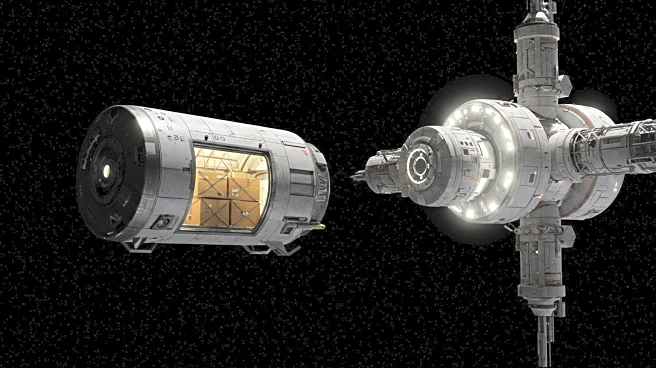What's Happening?
A SpaceX cargo ship, part of NASA's Commercial Resupply Services program, is set to dock at the International Space Station (ISS) on August 25, 2025. The Dragon capsule, launched atop a Falcon 9 rocket, is carrying approximately 5,000 pounds of food, supplies, and scientific experiments. The docking is expected to occur around 7:30 a.m. EDT, following a 29-hour orbital chase. This mission, known as CRS-33, aims to deliver essential materials to astronauts aboard the ISS and test technologies for future lunar and Mars missions, including 3D printing metal parts and bioprinting tissue in microgravity.
Why It's Important?
The CRS-33 mission is crucial for advancing space exploration technologies, particularly those that could support future missions to the moon and Mars. By testing 3D printing and bioprinting in microgravity, NASA and SpaceX are exploring ways to provide astronauts with tools and medical support during long-duration space missions. Additionally, the Dragon capsule will assist in maintaining the ISS's altitude, a task traditionally performed by Russian Progress cargo vehicles. This capability is increasingly important as Russia considers leaving the ISS consortium in 2028, potentially requiring other partners to rely on alternative methods for station-boosting.
What's Next?
Following the docking, the Dragon capsule will perform engine burns to help maintain the ISS's altitude, countering frictional drag. The CRS-33 mission is scheduled to conclude in December 2025, when the Dragon returns to Earth with scientific samples and gear, splashing down off the coast of California. As Russia contemplates exiting the ISS partnership, NASA and its partners may need to depend more on vehicles like Dragon and Cygnus for station maintenance, highlighting the importance of developing reliable alternatives for sustaining the ISS.
Beyond the Headlines
The potential departure of Russia from the ISS consortium could lead to significant shifts in international space collaboration. This development underscores the need for robust partnerships and technological advancements to ensure the continued operation and scientific output of the ISS. The success of missions like CRS-33 could pave the way for more autonomous and resilient space operations, reducing dependency on any single nation for critical tasks.











